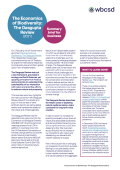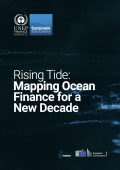


The Rising Tide report maps the current state of ocean finance revealing trends in lending, underwriting and investment activities which impact the ocean. It reveals the frameworks and financial instruments that are successfully addressing ocean sustainability and highlights new opportunities and gaps in the market. It looks across five major ocean-linked sectors chosen for their established connection with private finance: seafood, ports, maritime transport, coastal and marine tourism and marine renewable energy.
This forward-thinking report builds on the United Nations’ Sustainable Blue Economy Finance Principles.
A world-first, the United Nations’ Sustainable Blue Economy Finance Principles remain a keystone in the market, designed for financiers to align their activities with Sustainable Development Goal 14, ‘life below water’. By following these Principles, and building sustainable blue practices into their decision-making processes, the financial sector has a unique opportunity and a clear imperative to steer the ocean economy towards sustainability.
